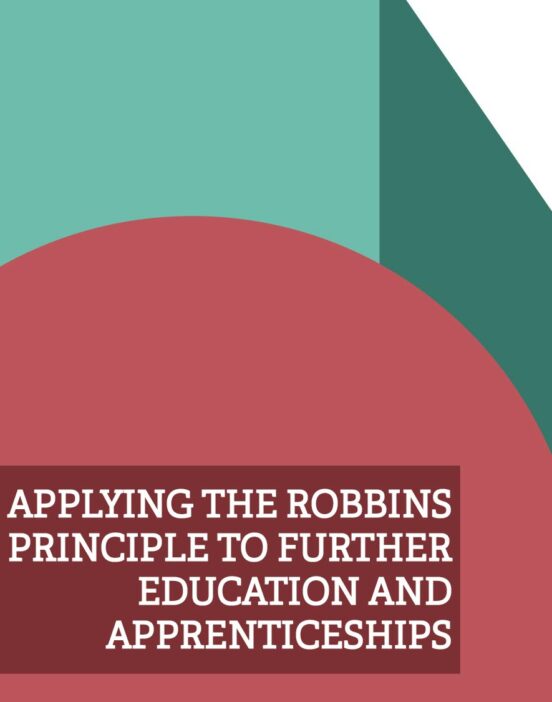Applying the Robbins Principle to Further Education and Apprenticeships

Britain does well at higher education, and badly for its non-graduates. The main problem is our failure to train more people when they are young. Shockingly, 30 per cent of 18 year olds are not in education or training – many more than in our competitor countries. Low skills for this group are a major cause of low national productivity and high wage inequality. Due to the shortage of skills, the rate of return to developing skills through further education and apprenticeship is high, but the facilities for skill development are far too thin on the ground.
Higher education has gone well because policy towards it has been guided by the Robbins Principle. This says that qualified people wishing to progress further should expect to find a place. But this
principle has never been applied to the ‘other 50 per cent’ – those going down the vocational route. If we want better productivity and higher wages, it is time to apply the Robbins Principle to them also. Doing so would require major changes in further education, and the supply of apprenticeship places for young people.
The number of apprenticeship starts for people aged under 25 is lower now than it was in 2010, and it is also lower than in many other countries. To make the Robbins Principle apply to apprenticeship would require an obligation on the government to ensure that enough places are available for all qualified young people wanting places. The 2009 Apprenticeship Act did just this, but it was repealed in 2011. To make it happen there would need to be local agencies (such as the mayoral authorities) charged with finding enough places in their locality.
Meanwhile, there has been a large increase in apprenticeships for people aged 25 and over. Some of this is welcome, but rates of return are lower at older ages than for apprenticeships at a younger age. If the Robbins Principle were to be applied, some guaranteed share of the Apprenticeship Levy would need to be reserved for people under 25 taking Levels 2 and 3 apprenticeships. And, for apprenticeships in non-levy paying firms, funding would need to become demand-led.
Steering Economic Change is a series of externally-written policy essays, each of which aims to provoke public debate on a specific policy area, and sketch out an agenda that will contribute towards the wider goal of the UK becoming a higher growth, lower inequality economy.
The essays cover topics ranging from the role of smarter regulation in
supporting economic growth, ensuring that the goal of ‘good jobs’ is embedded
in our national industrial strategy, and the role of the higher education sector in
providing the skills needed to power our services dominated economy.
They are written by a range of leading economists and policy experts, and reflect
the views of the authors rather than those of the Resolution Foundation, the
LSE or The Economy 2030 Inquiry.
They have been commissioned and edited by Gavin Kelly (Chair of the
Resolution Foundation and member of the Economy 2030 steering group) and
various members of The 2030 Economy Inquiry team.